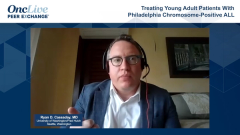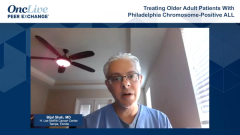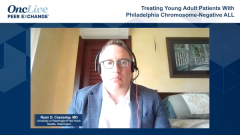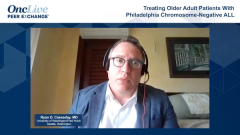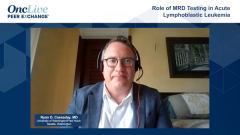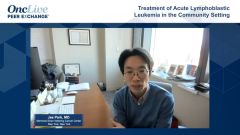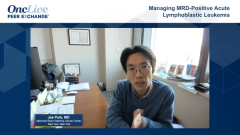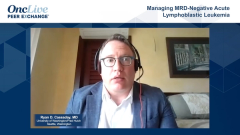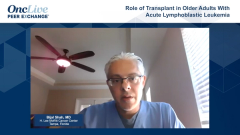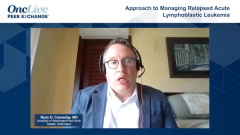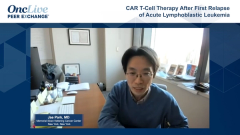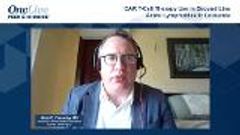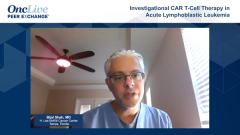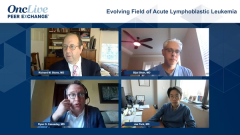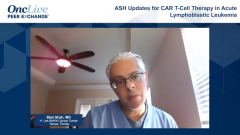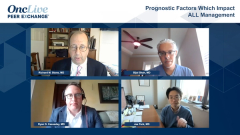
Investigational CAR T-Cell Therapy in Acute Lymphoblastic Leukemia
Episodes in this series

Richard M. Stone, MD: Let’s talk about some of the investigational CAR [chimeric antigen receptor] T-cell therapies, and which one is farthest along, perhaps KTE-019 [axicabtagene ciloleucel]?
Bijal Shah, MD: The Kite product, Tecartus [brexucabtagene autoleucel], is the furthest along in adult ALL [acute lymphoblastic leukemia]. Autolus Therapeutics is on their heels with their product, with a plan to start a multicenter trial in the United States and Europe very soon. That’s the low-affinity CD19 CAR. But right now, Kite is leading in this space. Noelle Frey, [MD, MS,] and the group at the University of Pennsylvania did do a single-center phase 1/2 with the tisagenlecleucel product, which is promising in terms of the data.
What we have right now are the phase 1 data from the US multicenter trial, and it’s very promising. These are heavily pretreated patients. The median number of cycles was 4. A lot of patients had prior BLIN [blinatumomab] and INO [inotuzumab]. Many of the patients had prior allogeneic transplant. We were still seeing high response rates, upward of 80%, essentially all MRD [minimal residual disease]-negative. We were able to deliver it with a manageable profile for CRS [cytokine release syndrome] and neurotoxicity. It was about 20% for grade 3/4 CRS and about the same once we started giving earlier corticosteroids for the neurotoxicity rates. We were able to push those down and successfully deliver this product even to older adults. I am happy with the data from phase 1, Dr Park and Dr Cassaday were part of that protocol.
What we hope is it joins this therapeutic armamentarium for ALL, so that we can have another option to throw into the mix. Then we can start to sort out these questions of how do you sequence and what’s the optimal place? It’s a powerful therapy.
Tisagenlecleucel is a CD19 CAR. It uses a 4-1BB costimulatory domain. It’s manufactured from bulk PBMCs [peripheral blood mononuclear cells]. Brexucabtagene autoleucel undergoes a process of T-cell selection first prior to manufacture, with the goal of filtering out the blasts. There the costimulatory domain is based on a CD28. What we see as a consequence, we think that the CD28 product expands faster and persists less in comparison to the 4-1BB product, which is going to have a slower expansion but then persist for a longer period.
Richard M. Stone, MD: Will it be more necessary to perform a second allogeneic transplant after the Kite product versus the Novartis product tisagenlecleucel?
Jae Park, MD: Adult ALL data are less clear. With the tisagenlecleucel in pediatric and young adult ALL, the ELIANA study, in which it got approved for up to the age of 25, the vast majority of those patients didn’t get transplanted and then were able to maintain a durable response, an EFS [event-free survival] of about 60% at the 1- and 2-year marks. Based on those data it doesn’t look like, at least in the pediatric and young adult ALL, you don’t need a 4-1BB now. Whether that’s driven largely by the 4-1BB or the biology of the pediatric and young adult ALL, that’s the part that we don’t know.
The Kite data, and our own Memorial Sloan Kettering Cancer Center data, which are very similar, but not the same manufacturing process…. Although our data showed there’s no overall survival benefit, the durability of remission tends to be higher with the transplant consolidation. It’s less clear with the 4-1BB versus CD28 question in adult ALL because there are conflicting data also from the Seattle Children’s [Hospital], coming from the children and adults. It may not be just about the construct, but the biology of the disease in this different age group also matters just as much.
Transcript Edited for Clarity


